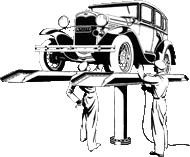
Model B
Model A Ford Garage
Zenith Carburetor Assembly Drawings
The following illustrations are taken from the original Model B Ford detail drawing B-9510-A of the Zenith carburetor. These pics show the basic part numbers of the components.
The table below shows the major differences between the regular and high altitude versions of the Model B carburetor. Also shown is the Zenith B style service carburetor expressly made and marketed for replacement use on the Model A.
| Description | B-9510-A1 Regular B Carburetor |
B-9510-B High Altitude B Carburetor |
0-6989 Model A Service B Carburetor |
|---|---|---|---|
| Idle Jet | B-9542 12 |
B-9542 12 |
B-9542 12 |
| Power Jet | B-9594 18 |
B-9594 18 |
B-9594 18 |
| Cap Jet | B-9538 35 |
B-9538 35 |
B-9538 35 |
| Main Jet | B-9534-A 19 |
B-9534-B 18 |
B-9534-B 18 |
| Compensator Jet | B-9575-A 18 |
B-9575-B 17 |
B-9575-B 17 |
| Float Valve | B-9564 44 |
B-9564 44 |
54 |
| Venturi | B-9586 22 (0.866) |
B-9586 22 (0.866) |
BF-9586-BR 20 (0.787) |
- The first column is the standard Model B carburetor, tuned for standard altitudes and fuel pump supply.
- The second column is the high altitude Model B carburetor, tuned leaner for high altitude operation, and with a fuel pump supply.
- The third column is the unusual Model A service carburetor, which was tuned for Model A cam and valve timing, engine speeds, and gravity fuel supply. It is both leaned out and has a smaller venturi size compared to a Model B Zenith.
The original Ford / Zenith carburetor jet number found stamped on the jet is the jet orifice size as expressed in 0.05 mm increments. For example, a jet marked number '18' has an orifice diameter of (18)*(0.05) = 0.9 mm = 0.035 inch.
Compared to a stock Model B carburetor, the B style service carburetor for the Model A used a larger float valve for use with the A's gravity-fed fuel system, smaller compensator and main jets, and a smaller diameter venturi, all for use with the A's lower compression cylinder head and lower lift/duration camshaft.
Follow this link for a chart of Model A and B Zenith Carburetor jet flow rates on Ford Garage.

 fordgarage.com
fordgarage.comPictured above is the basic parts of the throttle shaft, the idle mixture screw, and the gas adjusting valve. These parts are all similar but different than their Model A Zenith counterparts.


Pictured above is the basic part numbers of the venturi and jets. Also shown is the liquid line in the float bowl. The numbers next to the jets is the jet orifice size as expressed in 0.05 mm increments. For example a number 18 jet size is (18)*(0.05) = 0.9 mm orifice. The detail drawings of the jets also tell the flow rates of each jet.

 fordgarage.com
fordgarage.comPictured above is an end view showing the float components. Note the installed position of the float helper spring. Also note that this is the later so-called B2 carburetor with the rectangular float and float pivot spring.
More related information on Ford Garage:
- For more Model A & B related information, use the Site Search box at the top or bottom of this page.
- Model A & B Zenith Carburetor Jet Sizes & Flow Rates
- Model B & 46 Zenith Carburetor Parts Catalog Illustrations
- Model B & 46 Zenith Carburetor Float Details
- Model B & 46 Zenith Float Valve Orifice Details
- Model B & 46 Zenith Carburetor Power Jet Circuit
- Model B & 46 Zenith Carburetor Power Jet Tube
- Model B & 46 Zenith Carburetor Power Jet Tube Instructions
- Model B & 46 Zenith Carburetor Catalog Data
- Model B & 46 NOS Zenith Carburetor
- Model B & 46 Zenith Carburetor Upper Casting Variations
Vince Falter
May 2005

